The amazing advantages of ADHD at work
Every year in October marks ADHD Awareness Month, a campaign for educating, advocating for, and empowering individuals with attention deficit hyperactivity disorder (ADHD). And here at F4S, that’s cause for celebration!
ADHD is a neuro-developmental difference (we don’t like labeling it as a “disorder” at F4S) that is characterized by distractibility, hyperactivity-impulsivity or a combination of both. 3% of the global adult population has ADHD.1
To highlight why we believe ADHD is a superpower that can’t be ignored, and why everyone should celebrate it, we’re sharing some pivotal findings from our proprietary study on ADHD in the workplace.
We've uncovered exciting, and important differences that are set to redefine the conversation about ADHD at work, shedding light on the remarkable strengths that individuals with this unique cognitive style bring to the workplace.
But first, what is F4S?
Fingerprint For Success (F4S) is a collaboration and performance technology that empowers individuals and teams to achieve amazing things at work and in life. Based on more than 20 years of research, F4S’ revolutionary predictive analytics have achieved more than 90% reliability in forecasting personal and team motivations, behaviors, and performance. In 2020, F4S launched the world's first AI Coach 'Marlee' to help users optimize their talents and bring out the best in themselves and their teammates.
What did our study on ADHD in the workplace measure?
From July 2022, we pioneered a global study What are the superpowers of ADHD at work? We wanted to find out whether people who experience ADD/ADHD have distinct motivations or cognitive patterns that drive them at work. F4S surveyed more than 700 people from 71 countries, with a range of respondents from different age brackets (Gen Z, Millennials, Gen X and Baby Boomers).
We aimed to explore how individuals with ADD/ADHD thrive and realize their full potential at work, and to help leaders provide a supportive workplace that embraces and celebrates cognitive diversity.
So, what did we learn?
Overall, what are the advantages of having ADHD?
According to F4S research, having ADHD offers a range of advantages that contribute to workplace success. An ability to hyper-focus on the details, along with an unconventional approach to work problems makes ADHDers born to break ground and innovate.
People with ADHD are also highly adept in remote work settings and have demonstrated greater tolerance for different workstyles and approaches to problems.
F4S research highlights the unique advantages of ADHD at work
It's still early days, but we've uncovered groundbreaking findings on the advantages of ADHD in the workplace. We believe these preliminary findings, combined with the existing scientific literature, will have wide-ranging implications for the future of work, and people with ADHD’s place within it.
Here are some of the most exciting preliminary results, relativized to the US working populations, with 50% being the average.
Remote work is a win for ADHDers
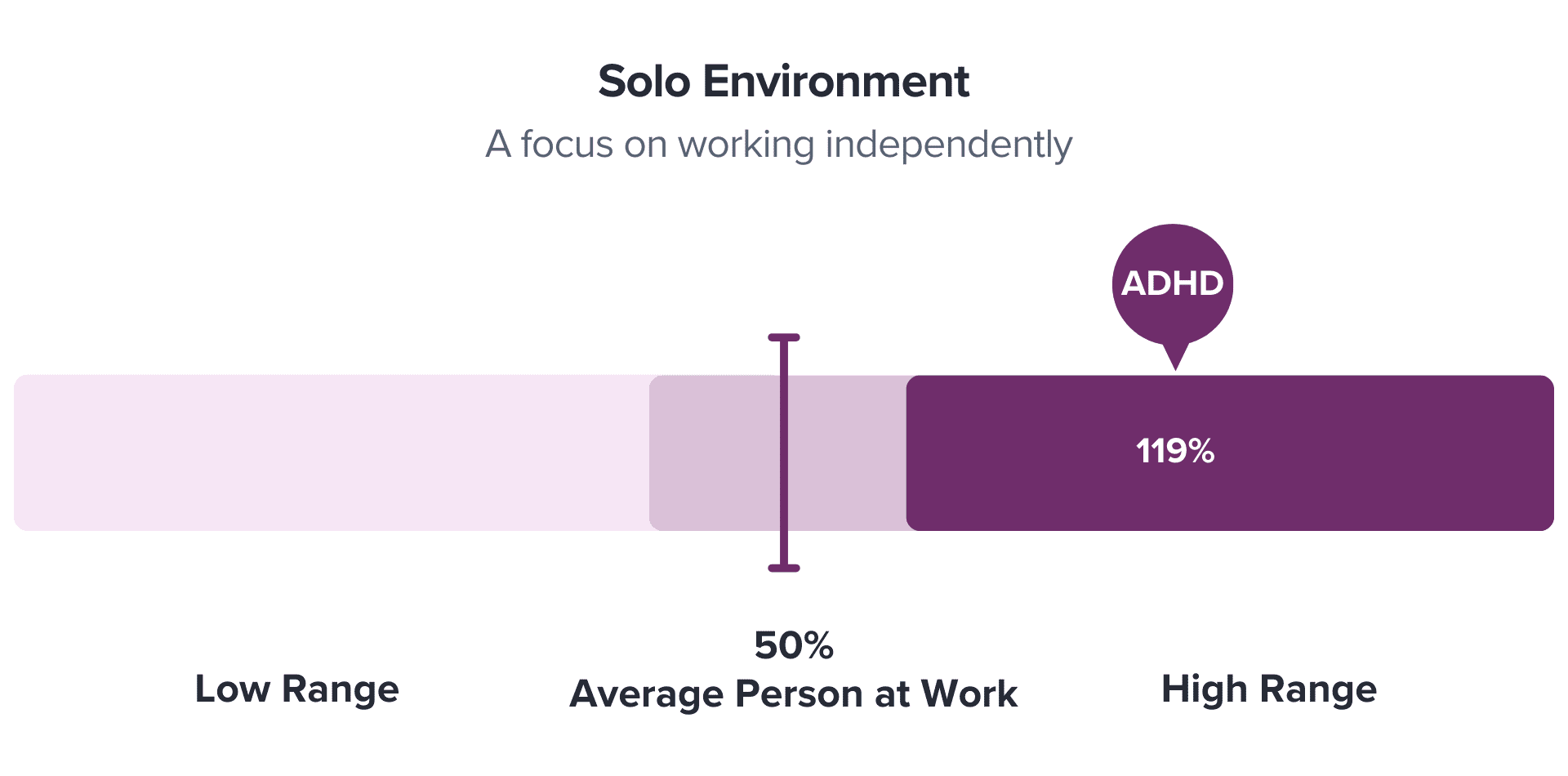
According to our research, individuals with ADHD have a high preference to work uninterrupted and in solo spaces (Solo Environment). This may include working alone, being in a space where people can’t spontaneously interrupt, and blocking out time to work individually on tasks. While some people have mixed feelings about the shift to remote working, many ADHDers across the working world likely rejoiced. The general 'hum' of an office can be highly distracting for people with ADHD. Chatty coworkers may easily be ignored by a neurotypical person, but to an ADHDer, it can be kryptonite to their productivity.
It's little wonder that people with ADHD exhibited a strong preference for working in solo spaces. In their own space, they can be in control, and eliminate distractions. It's here that people with ADHD are able to hunker down, focus and thrive.
What can we learn from this? It means that people with ADHD are far more motivated to thrive in remote working environments and virtual teams. In a new era where remote or hybrid work are more common, many people with ADHD are able to access their talents more than ever.
While it isn’t common knowledge, there is strong evidence to suggest that Leonardo Da Vinci2, Alexander Graham Bell3, and Thomas Edison4 would have been diagnosed with ADHD if they lived today. What each of these great innovators had in common was a need for their own solo working spaces, this is where they could get into the mindset they needed to work their magic.
The question is: how many other ingenious innovators have been cooped up in a noisy office until now?
Overall the research found most people with ADHD are far better able to access their unique genius when they’re alone. Given that remote work is now much more common, we may well be on the cusp of a wave of ADHD-powered innovation.
Watch this space!
People with ADHD have a high motivation for identifying problems
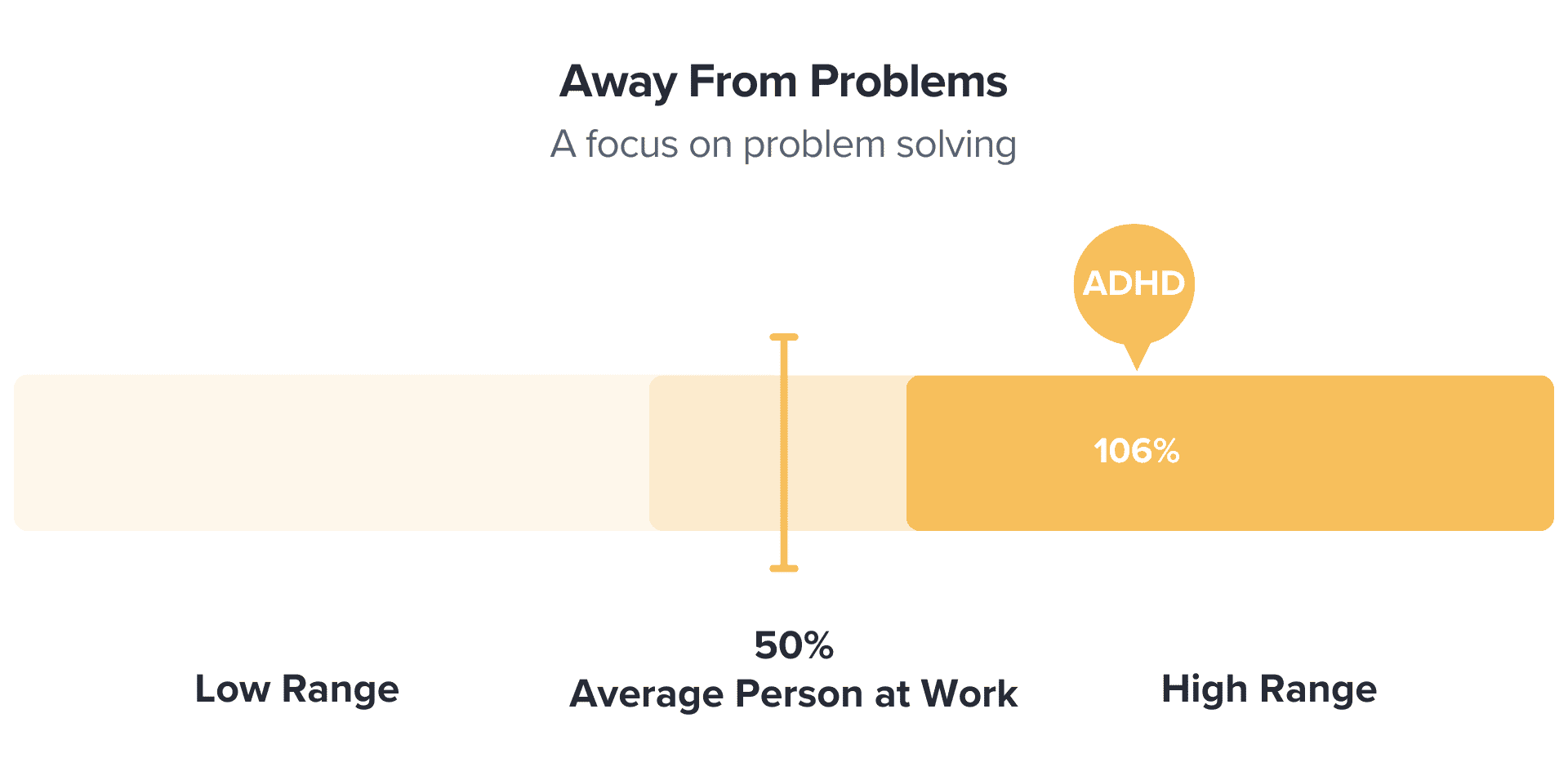
This was one of the most revolutionary findings in our research study, as it indicates many people with ADHD are highly motivated to solve and identify problems (Away From Problems). They are likely to thrive in projects and roles where they can prevent and deal with complex challenges, and navigate around roadblocks.
People with ADHD are far more energized by navigating away from and solving problems than by setting and achieving goals. While much of our culture lionizes the importance of goal setting, actually, a robust, disruption-ready organization also needs people who are problem-oriented.
In an increasingly tumultuous business landscape, the prevalence of this trait among ADHDers highlights the tremendous value they have to forward-thinking organizations.
ADHD employees drill down into the details
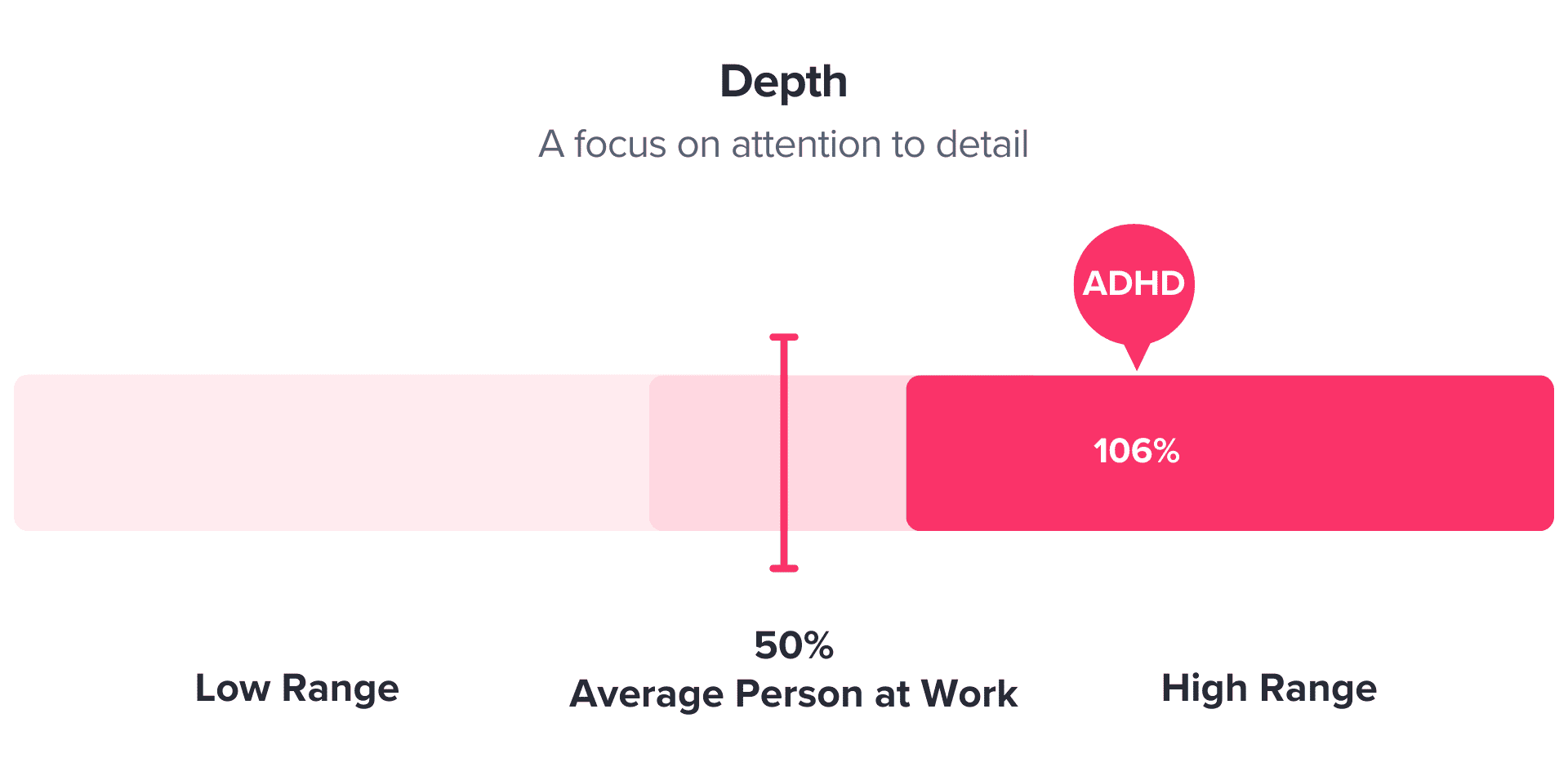
When it comes to an area of expertise, passion or something they genuinely love and are highly motivated by, our preliminary findings show that ADHDers on average have the ability to really drill down into the details (Depth). This is known as hyperfocus, and it's one of the key superpowers that give people with ADHD a distinct advantage.5 They're often so focused on what's occupying their attention that nothing else matters.
Consider the stories of a young Bill Gates (who was later diagnosed with ADHD6) when he was writing the code that would become Microsoft.
Gates famously worked day-in, day-out. He often fell asleep at his desk, woke up and immediately began writing code again. These intense bouts of focus came at the exclusion of all other things that weren't related to what interested him most: Building Microsoft.7
While we at F4S believe in a healthy work life balance, Gates’ story does illustrate the tendency we see in people with ADHD to dive deep into the details, and lose track and awareness of time. To a casual observer, the young Gates' bedraggled appearance and lack of care for mundane daily tasks may have appeared as a lack of attention to detail. In reality, he was so deep in the details of what interested him that there was no room for anything else.
ADHDers are open-minded and value diversity
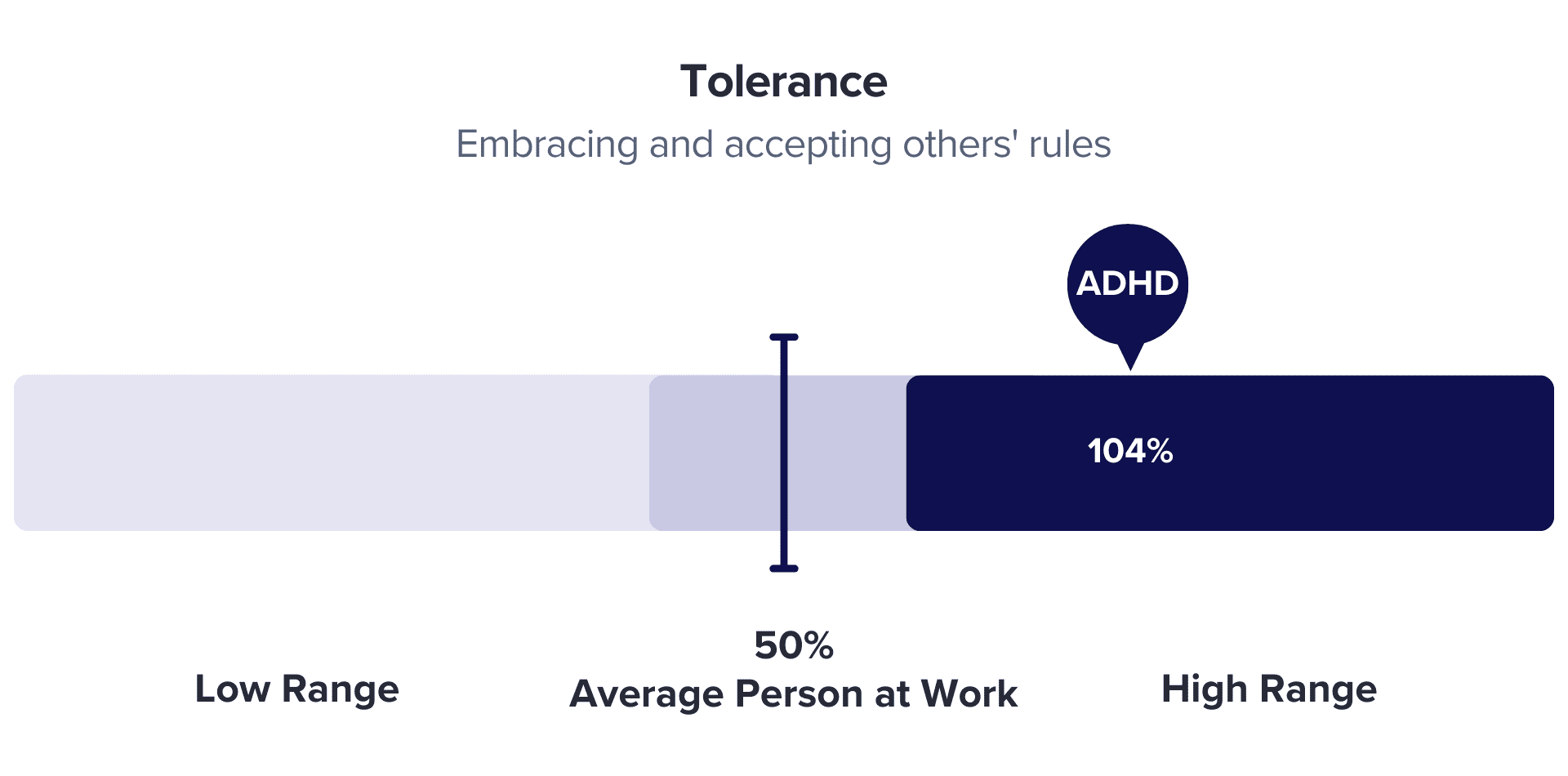
Our preliminary findings show that people with ADHD are highly motivated to accept and appreciate the unique styles, customs, perspectives, and rules of others (Tolerance). A high emphasis on this motivation promotes a supportive work culture that prioritizes psychological safety, open communication, inclusivity, and the uniqueness of others.
With their sensitive nervous systems,8 people with ADHD can be highly empathetic towards different types of people. For this reason, they're adept at understanding and tolerating differences in others.9 On a sociological level, people with ADHD have often felt othered, or ostracized for simply being themselves, and so they may feel a natural affinity with other people who are different.10 They have also been found to have a higher injustice sensitivity, making them great advocates for fairness and tolerance.11
This trait makes people with ADHD natural allies for marginalized groups, and they can bring extra passion and energy to roles related to social justice.
Take the highly acclaimed director of Barbie and ADHDer12 Greta Gerwig for example.
Gerwig is noted for her ability to actively encourage actors to include their own personalities in their performances.13 It isn’t uncommon for writers and directors to be prescriptive of what they want from their actors, but this isn’t Gerwig’s style. Instead, she takes the role of facilitator. This is typical of leaders in the workplace who have a strong bias for tolerance, they listen, and appreciate the unique perspectives their employees bring to the table.
People with ADHD are out of the box thinkers
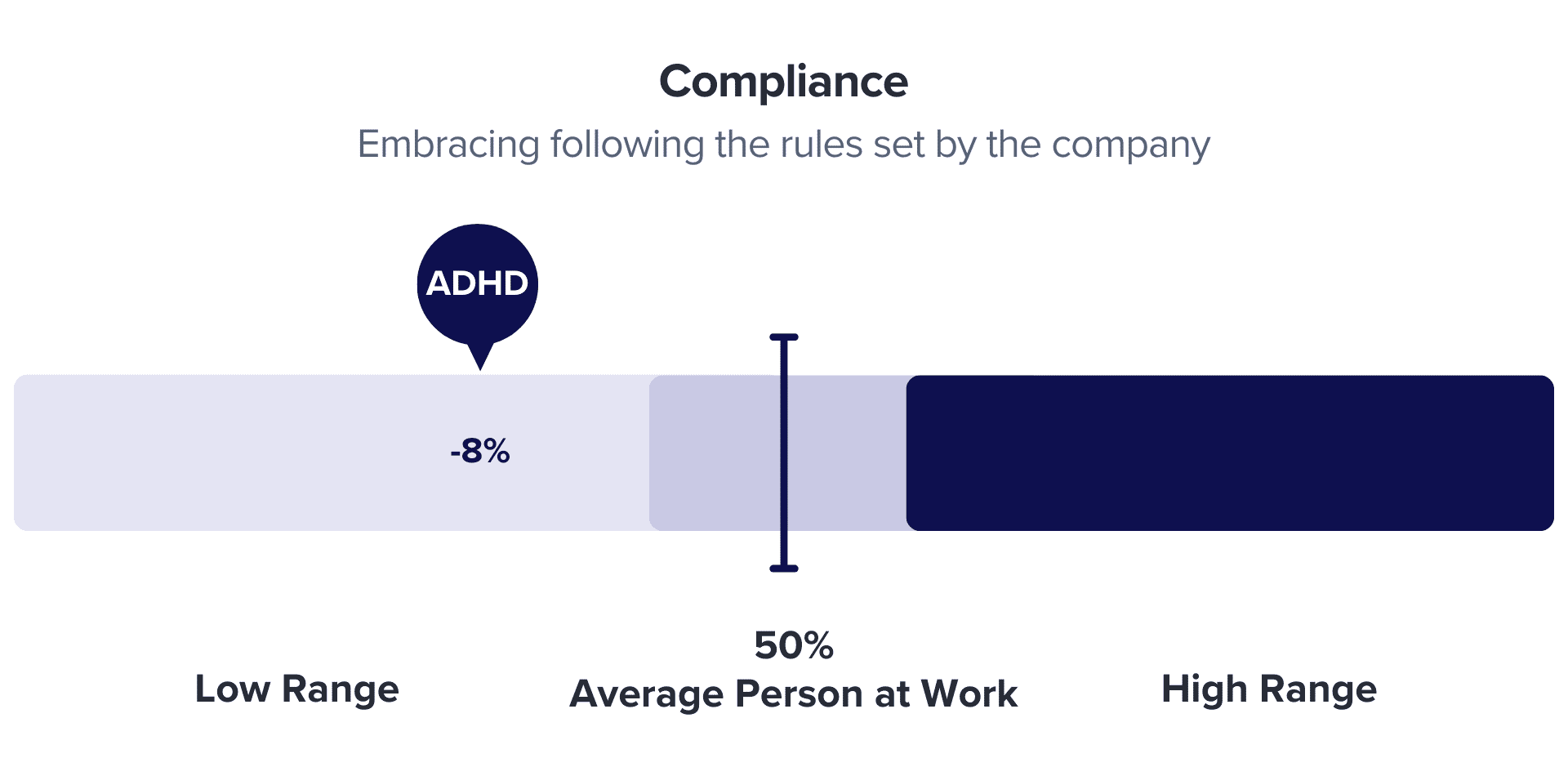
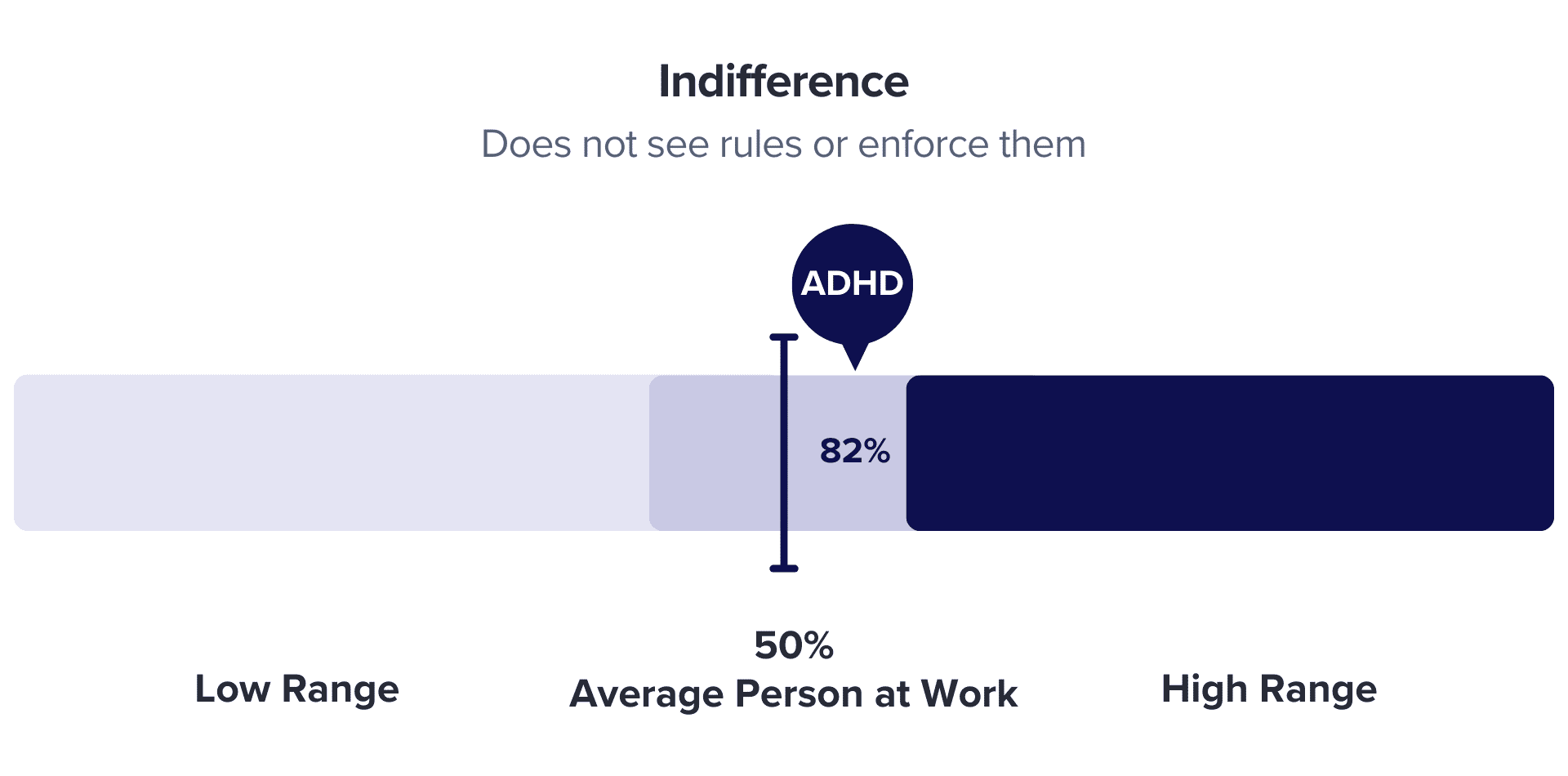
Our research found that ADHDers are overall less energized by following company rules (Compliance), and are highly motivated to be creative out-of-the-box thinkers (Indifference). This motivational combination is incredibly useful for breaking new ground and inventing diverse ways of working.
When outside-the-box thinking is needed, adherence to the rules can only get you so far. That's where people who aren't motivated by status quo thinking can become your most valuable asset. And people with ADHD, overall, were found to have this trait in spades.
Children with ADHD are often stereotyped as being rule breakers and mischievous, but given the right conditions, this same trait can lead to high achievement in adults.
Take the late founder of IKEA and (you guessed it) ADHDer,14 Ingvar Kamprad.
At the age of 5, Kamprad began running his own business selling matches. While this might not sound too mischievous, keep in mind that this was 1931. A time when small children "should be seen and not heard." He was oblivious to the "rule" that 5-year-olds didn't run businesses; he was too busy marching to the beat of his own drum. Fast forward 12 years later, and he founded IKEA. Under his leadership, IKEA became the largest, most groundbreaking homewares retailer in the world and has maintained its innovative, always moving and evolving, very ADHD brand identity ever since.
So, we can see that the pioneering, entrepreneurial spirit is alive and well in people with ADHD. But does this mean ADHDers are always ignoring the rules?
Your ADHD team members are reliable, and motivated by consistency
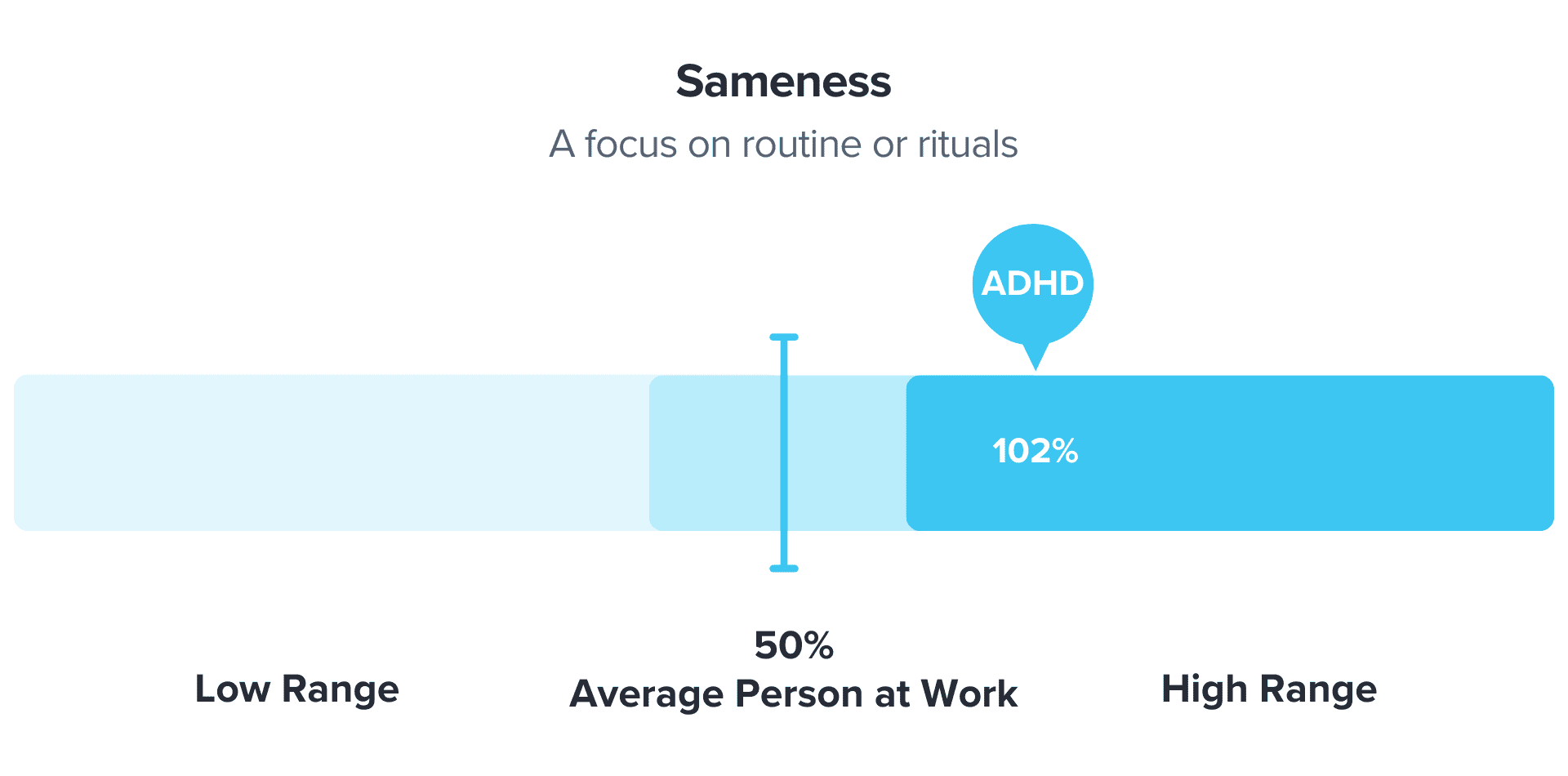
Our research findings show that ADHDers derive energy from maintaining stability and consistency (Sameness). They have a strong preference for finding patterns, mapping new information against what they already know. Surprisingly in some situations, ADHDers very much enjoy doing the same things over and over and may often prefer things to stay the same.
But wait, aren’t they also trailblazing innovators who ignore the status quo?
The answer is complicated - they’re often both.
To reach their goals, many people with ADHD have learned to be highly disciplined. They may adhere to their own personal unwavering systems and processes, and rely on them to create order in their lives, and this tendency is often present in the workplace. It may not necessarily be an in-built trait, rather, an adaptation to their condition. And indeed, many ADHD coaches, or therapists teach these skills.15
Take, arguably, the most decorated athlete of all time and proud ADHDer, Michael Phelps,16 for example.
Phelps was known, even when compared to other elite athletes, to have a highly structured and regimented training program.17 He swam 13 kilometers a day, 7 days a week, even on birthdays. And that’s just in the pool. He also had his weight training (3 days a week), his stretch routines that bordered on the religious, and his highly monitored and optimized diet. But this lifestyle didn’t come naturally to Phelps. As a teenager, he struggled to pay attention and to keep up with the day-to-day routine of school life. The strict routines that he later developed were an adaptation that his coach, Bob Bowman helped Phelps to implement.
So, while people with ADHD may not be naturally motivated by consistency, Phelps’s story and our research demonstrates that they can, and do adapt. With the right coaching or assistance, people with ADHD can be highly systematic and process driven, more so than the broader population.
ADHDers are highly motivated by commercial performance
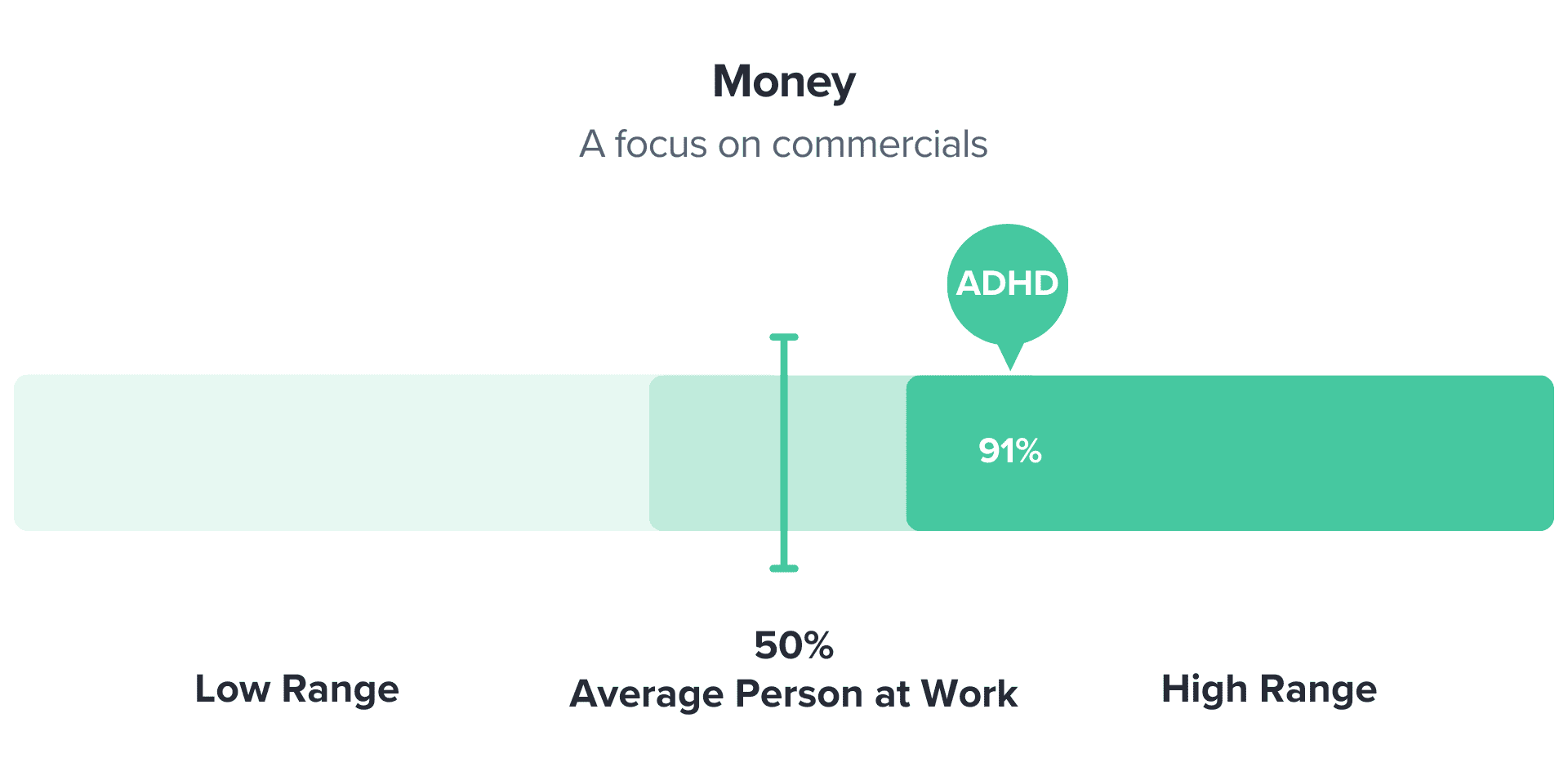
Another finding from our research study was that people with ADHD have an interest in the commercial and financial aspects of business (Money). This may manifest as a focus on grounding projects, products, services, and business ideas in the commercial space, or feeling empowered to carefully track and monitor financials.
Take founder of Kinko’s and author of Two Billion Dollars in Nickels, Paul Orfalea, for example.
Orfalea was born in a time when awareness of ADHD was low. He was labeled a “problem child”. Though he struggled in the classroom, he had a well attuned business acumen with a focus on dollars and cents from a young age. After scraping his way through school and into university, it was there that he noticed professors and students were paying US$0.10 to make copies of their class materials. After crunching the numbers, he saw that he could provide a much cheaper service, and Kinko’s was born.
With an estimated net worth of US$250 million, Orfalea credits his struggles with ADHD to his success with business. As a struggling teenager, he was forced to forge his own path and find opportunities to leverage his strengths, which is exactly the path he took in business as an adult.
The bottom line: ADHD is a win for the modern workplace
In short, our preliminary findings demonstrate that it's time to start thinking of ADHD as a huge asset to any organization. Companies that foster their ADHD talent can fully leverage the unique magic they bring to the workplace. ADHDers’ problem-solving acumen, ability to spot threats and weaknesses and unconventional approaches are traits that companies are wise to embrace.
Stories of success: thriving because of ADHD
We've listed some ADHD mega-success stories above, but in case those feel out of reach, here are some lesser-known, but equally impressive ADHD success stories in the world of business.
These successes were achieved, not in spite of their diagnosis, but because of their diagnosis.19
Jenny Dearborn - Silicon Valley Executive
Jenny Dearborn is a Silicon Valley-based Board Director, Advisor and Investor. Anybody looking at her career trajectory might assume that things have always come easily to her, but this is far from the case. It wasn't until the age of 18, after spending her childhood years in special education, that she was diagnosed with ADHD, Dyslexia and Obsessive Compulsive Disorder (OCD). It was with this diagnosis that Jenny began to turn her life around.
When reflecting on her journey from the back of the class to the boardroom, Jenny has this to say:
"Because of my personal experience, I’ve always sought out opportunities to help people identify their true gifts and fulfill their potential. Since then, I’ve spent my career at global technology companies, first in corporate learning and development and now in human resources. It’s still all about empowering people and it’s great to see that more companies today are pursuing the benefits of all kinds of diversity."
Jenny Lachs - Founder of Digital Nomad Girls
Like many people with ADHD who were diagnosed late in life, the diagnosis suddenly made everything seem clear. Once a chemist, turned founder of Digital Nomad Girls, Jenny had always struggled with ADHD, only without knowing what it was.“I feel like I spent 90% of my energy throughout my life trying to get myself organized," a phrase that people with ADHD know all too well. When it comes to tips on how to make it work, Jenny has the following to say:
"Don’t try to fit into other people’s molds. Recognize your uniqueness and create business systems that work for you."
Reet Singh - Founder of TripOutside
Like many ADHD founders, Reet built a business that allowed him to follow his passions and make the most of his uniqueness. To this end, Reet and his wife, Julie, founded TripOutside: a platform for connecting local adventurers and online gear bookings.
He has 3 top tips for staying focused and productive:
Meditate
To recognize distractions and get back into a state of focus.
Spend time outdoors
Mountain biking, hiking, snowboarding, or even just walking the dog.

Limit social media
Rather than relying on his willpower, Reet uses browser extensions and other tools to limit his usage.
Best jobs for someone with ADHD
It's important to remember that there's no such thing as specific jobs that are good, or bad for someone with ADHD. You can find people with ADHD thriving in all corners of the job market, as their attributes are valuable everywhere.
There are, however, certain workplace environments and types of companies that people with ADHD are more likely to be drawn to, and typically do best in.
How to support your ADHD team to thrive
Our research shows people with ADHD do better in more creative, agile and less bureaucratic institutions. Their low motivation for Compliance and high motivation for Solo Environment means that working in a cubicle in an administrative role is likely akin to torture. They're much more motivated by, and will flourish in, less structured environments that offer hybrid or entirely remote work options. Think startups, boutique creative agencies or working as freelancers or entrepreneurs.
ADHD workplace accommodations
To really allow for that ADHD magic to flourish, it's necessary for workplaces to make reasonable accommodations to truly gain the most from their ADHD employees.
Allow for greater flexibility
People with ADHD need additional flexibility to perform at their best. Some days, they just need to do what they need to do to get into the right headspace for productive work. Whether it's taking a short and vigorous walk, or even a gym break, ADHDers can, and do get the same amount of work done, sometimes even more; they just need to do things in their own time and in their own way.
Assistance with task prioritization
Sometimes, people with ADHD struggle to know which tasks to prioritize. They may feel lost at sea when they have too much to do, and no clear system for prioritizing it. Of course, it's important not to stereotype or assume, but if you're a manager of somebody who has ADHD, assisting them with prioritizing their tasks often goes a long way.
If you have ADHD and struggle to prioritize tasks, if you feel safe, we recommend that you ask for help in this regard. This might include breaking down tasks into simple actionable steps, or ranking items in terms of importance.
Record, transcribe, or summarize meetings
People with ADHD often feel distracted during meetings. They may be interested in the topic, but have some difficulties in following along, or retaining all of the information and knowing what the important next steps are. If possible, have meetings recorded or transcribed so that people with ADHD can easily catch up on what they missed if need be.
Forward-thinking organizations have already built this into their standard meeting practice for ADHDers, and non-ADHDers alike.
Here are some team meeting agenda templates you can download to get you started.
What are some of the struggles that people with ADHD face?
While there are many cognitive advantages of ADHD in the workplace, there are also some challenging aspects to being neurodivergent such as:
- Short attention span (for mundane tasks)
- Emotional dysregulation
- Disrupted executive function
- Prevalence of anxiety disorders and other mood disorders
- Difficulty handling stressful situations
- Difficulties with time management
However, there are various behavioral therapy modalities such as ADHD-focused therapy that can offer extensive benefits for people with ADHD. Here, ADHDers learn behavioral strategies and other techniques to help them thrive. If you're looking for such therapies, consult your health care provider to pair you with a qualified professional.
Who are some famous people diagnosed with ADHD?
Due to the many cognitive advantages that people with ADHD have, it's unsurprising that many of them have risen to the top of their chosen fields.
Here is a short list of some famous people who have been diagnosed with ADHD:
- Justin Timberlake
- Adam Levine
- Michael Phelps
- Solange Knowles
- Howie Mandel
- Simone Biles
- Paris Hilton
- Emma Watson
- Bill Gates
- Ingvar Kamprad
Many of these people have been open in discussing ADHD and the toll it can take on their mental and physical health, but also the wide range of benefits they've experienced as a result of their neuro-developmental difference.
Take part in our research now!
We’re still completing our ADHD research and would be so grateful for you to contribute to our study. We truly believe that the abilities of people with ADHD are endless, and with your help, we can shed light on what makes people with ADHD tick at work, and how to allow them to fully flourish.
Recommended program for you:
Our expert coaches developed a 9-week Vital Wellbeing program to help you learn how to calm anxiety quickly and build emotional resistence.
Coach Marlee (your amazing AI-powered personal coach) will analyse your unique traits and goals to personalize the program so you see results as quickly as possible.
Testimonials

“Blew my mind, had no idea how arrogant I have been. Total blind spot. I really like the multiplier stuff”

"I have learned how to communicate better using every tool I have in myself, especially in learning how to use my tone of voice"

“Quite amazing how many things get done when they are initiated!”

"Wow this program has totally changed my relationship to goals! Thanks so much Marlee, I miss you already"

“Marlee helped me to work on my self-belief”

“The only way to move ahead is to work out the next action and then schedule a time to do it!”

“I’ve always found it daunting to be a leader, I have never sought out to be the one in charge. The positions have always found me. I now have new confidence. I especially like the concept of leadership through context. Very empowering”.

“This was a good reflection and trigger to make the decision that I was pondering!”
- Curtin University, 2023, Global review reveals ADHD rates in adults, Available at: https://medicalxpress.com/news/2023-09-global-reveals-adhd-adults.html
- Daley, J, 2019, New study suggests Leonardo Da Vinci had ADHD, Available at: https://www.smithsonianmag.com/smart-news/new-study-suggests-da-vinci-had-adhd-180972359/
- Sci Journal, 2023, Top 17 Famous Scientists with ADHD that you may not know, Available at: https://www.scijournal.org/articles/famous-scientists-with-adhd
- Hartmann, 2005, The Edison Gene: ADHD and the Gift of the Hunter Child, Available at: https://www.amazon.com/Edison-Gene-ADHD-Hunter-Child/dp/1594770492
- Flippin, R, 2023, Hyperfocus: The ADHD Phenomenon of Intense Fixation, Available at: https://www.additudemag.com/understanding-adhd-hyperfocus/
- The Brain Workshop, Successful People with ADHD, Available at: https://www.thebrainworkshop.com/blog/successful-people-with-adhd/#:~:text=With%20an%20estimated%20net%20worth%20of%20%2492%20billion%2C%20Gates%20has,professional%20heights%20in%20his%20life.
- Guggenheim, D, 2019, Inside Bill Gates’s Brain: Decoding Bill Gates, Available at: https://www.imdb.com/title/tt10837476/?ref_=ttfc_fc_tt
- Kessler, Z, 2019, My Hypersensitivity Is Real: Why Highly Sensitive People Have ADHD, Available at: https://www.additudemag.com/hypersensitivity-disorder-with-adhd/#:~:text=Clinicians%20working%20with%20people%20with,Driven%20to%20Distraction%20(%23CommissionsEarned).
- Hallowell, E, 2021, ADHD and Empathy: A Double-Edged Sword, Available at: https://www.hallowelltodaro.com/blog-raw-feed/2021/1/28/adhd-and-empathy
- Bastien, M, Examining the Relationship Between Ostracism and ADHD, Available at: https://escholarship.org/content/qt638287br/qt638287br_noSplash_abd8adfa7066b8c91fd5fae6ca3ca6e0.pdf?t=n194m6
- Focus on Adult ADHD, Oh, the injustice! Do people with ADHD feel injustice more? Available at: https://focusmag.uk/oh-the-injustice-do-people-with-adhd-feel-injustice-more/#:~:text=ADHD%20and%20Justice%20Sensitivity,and%20behavioural%20responses%20to%20injustice.
- Times of India, 2023, Barbie Director Greta Gerwig on ADHD diagnosis, Available at: https://timesofindia.indiatimes.com/life-style/health-fitness/health-news/barbie-director-greta-gerwig-on-adhd-diagnosis-always-had-a-tremendous-amount-of-enthusiasm/articleshow/101849202.cms?from=mdr
- Youtube (archived footage), 2018, Realizing Lady Bird, Available at: https://web.archive.org/web20190111213442/https://www.youtube.com/watch?v=xT23PMOSnAk&gl=US&hl=en
- Archer, D, 2014, ADHD: The Entrepreneur’s Superpower, Available at: https://www.forbes.com/sites/dalearcher/2014/05/14/adhd-the-entrepreneurs-superpower/?sh=7cfaf72759e9
- Helpguide.org, Treatment for Adult ADHD, Available at: https://www.helpguide.org/articles/add-adhd/treatment-for-adult-adhd-attention-deficit-disorder.htm#:~:text=Therapy%20for%20adult%20ADHD%20can%20teach%20you%20better%20coping%20skills,-Treatment%20for%20ADHD&text=Some%20therapies%20focus%20on%20managing,Talk%20therapy.
- Dutton, J, 2021, How Swimming Saved Michael Phelps: An ADHD Story, Available at: https://www.additudemag.com/michael-phelps-adhd-advice-from-the-olympians-mom/
- Finty, 2023, Michael Phelps Daily Routine, Available at: https://finty.com/us/daily-routines/michael-phelps/
Related Articles
What’s your communication style?
Learn how to connect with colleagues and boost workplace motivation.

Name Surname
Position, Company name

Name Surname
Position, Company name

Name Surname
Position, Company name

Name Surname
Position, Company name

Name Surname
Position, Company name

Name Surname
Position, Company name
Your submission has been received!

Hack your wellbeing, productivity and goals
Programs are created by expert coaches & delivered by our incredible A.I. Coach Marlee. Sessions only take 5-15 minutes and are 100% personalized to fit your unique traits and goals.
